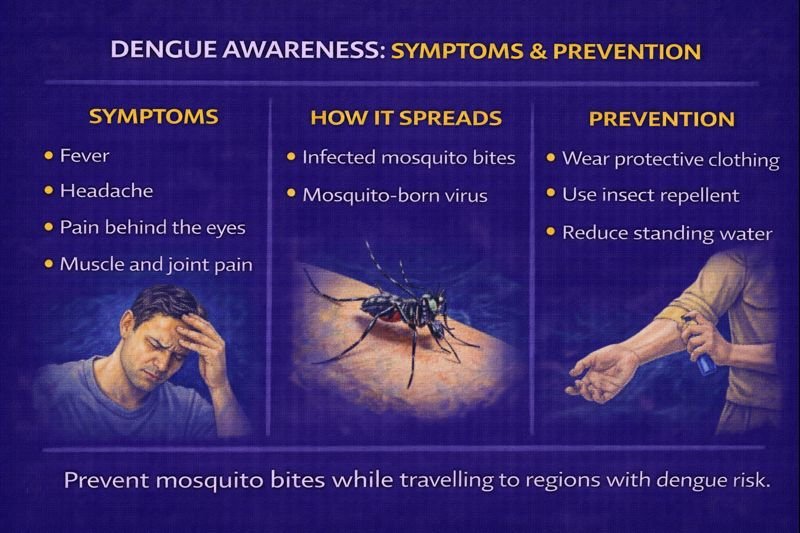Dengue Awareness: Symptoms, Transmission & Prevention for Travellers
 What Is Dengue?
What Is Dengue?
Dengue is a viral infection spread by certain mosquitoes in tropical and subtropical regions. The illness is common in many parts of Asia, the Pacific, the Caribbean, Central and South America, and Africa.
Relevance for Canadians, Travel & Workplace First Aid
Canadians travelling for work, leisure, or family visits may encounter mosquito-borne illnesses. Awareness helps people recognize symptoms early, reduce mosquito exposure, and make informed decisions about seeking medical evaluation after travel.
Scenario: Mild & Realistic
A Canadian traveller returned from a two-week vacation in a tropical region. A few days later, they developed a fever, headache, and discomfort behind the eyes. They rested at home and booked a medical assessment after recalling that dengue was common in the area they visited.
Symptoms of Dengue
Symptoms usually develop within two weeks of being bitten by an infected mosquito. Commonly reported symptoms include:
-
Fever
-
Headache
-
Pain behind the eyes
-
Muscle and joint discomfort
-
Fatigue
-
General flu-like feeling
Healthcare professionals can help rule out other illnesses with similar symptoms such as influenza, COVID-19, or other travel-related infections.
How Dengue Spreads
Dengue does not spread from person to person. Instead, transmission occurs when:
-
A mosquito bites someone carrying the virus in their bloodstream.
-
The mosquito becomes infected.
-
The mosquito bites another person and passes the virus along.
The most common dengue-carrying mosquito, Aedes aegypti, thrives in warm, humid, and urban areas.
Diagnosis
A healthcare professional may:
-
Ask about recent travel history
-
Review symptoms
-
Check for exposure to mosquitoes
-
Request a blood test to look for dengue virus markers
Travel history is often important for distinguishing dengue from other illnesses.
Management & First Aid Awareness
Most dengue cases improve within 1–2 weeks. First aid education emphasizes:
-
Rest
-
Hydration
-
Monitoring symptoms
-
Seeking medical assessment for persistent or worsening illness after travel
Healthcare professionals determine if additional monitoring or testing is needed.
Possible Complications
A small proportion of individuals may develop a more serious form sometimes called “severe dengue,” which requires close medical monitoring in hospital. Public health sources note that complications can include bleeding, shock, and organ involvement.
Prevention & Travel Considerations
Because there is no widely available vaccine for dengue for general travellers, prevention focuses on avoiding mosquito bites:
-
Wearing long sleeves and pants
-
Using insect repellent during daytime and evening hours
-
Staying in accommodations with screens or air conditioning
-
Reducing standing water where mosquitoes breed (local public health measure)
Who Is at Risk?
Anyone visiting or living in dengue-endemic regions can become infected. Outbreaks can occur during rainy seasons or periods of high mosquito activity.
FAQ — Dengue Travel Awareness
1. Can dengue spread between people?
No. Transmission occurs through infected mosquitoes.
2. When should someone seek assessment after travel?
If fever or flu-like symptoms appear within two weeks of returning from an area with dengue, healthcare professionals may recommend evaluation.
3. Do all dengue cases become severe?
No. Most clear with rest and fluids, though a small portion may require hospital monitoring.
4. Do mosquitoes carrying dengue bite at night?
Aedes mosquitoes commonly bite during the day and early evening.
5. Can dengue be prevented?
Exposure can be reduced through mosquito bite prevention strategies, especially during travel.
Educational Note
This article promotes public and travel health awareness. Healthcare professionals guide diagnosis, monitoring, and care decisions for suspected infections.

